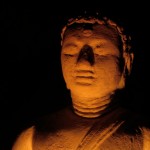“A good translator, although he must alter the form of what he translates, never changes the meaning. In fact, his whole purpose is to change the form so that the original meaning is retained.” T-7. II.4:3-4
Once a week I used to have the delightful opportunity to read for a blind man. Robert, a seeker of truth since his early 20’s, was then 86. His most prized possession was a library containing the works of the world’s greatest mystics, theologians, philosophers, and teachers.
At my first meeting with Robert he asked me to find and read from Meditations by Marcus Aurelius. It was a well used book with sections underlined and margins marked with comments and questions. (In the months that followed, I found that to be true of most of the books in this library.)
Never having read Marcus Aurelius, I was surprised to learn the great Roman Emperor spoke the language of choice and mind training that had become so familiar to me in A Course in Miracles. I understood him perfectly and soon the three of us—Marcus, Robert, and I—were sharing the same transcendent country in the mind.
Months later, after many reading sessions with Marcus and Robert, I decided I had to have a copy of Meditations to add to my library. Amazon had several translations, and not finding any comments that set one apart from another, I chose one for no particular reason.
When my copy arrived I took the first opportunity I had to settle into my reading chair and began. After a few paragraphs I started to feel something was missing. The words seemed similar but they did not take me to same place of communion with the great mind of the Emperor.
The next time I read for Robert, I took my book and compared the same section in Robert’s translation. Some of the words were the same, many were different, but the meaning was alive in Robert’s translation and not in mine. Having learned the value of a good translation I sent my copy back to Amazon.
When A Course in Miracles came into my life back in 1976 there were no study groups, no interpreters, and no translators (that I knew of), and there were many times when I did not understand what I was reading. On those occasions I would ask Jesus or the Holy Spirit to help me and somewhere during the events of the day the meaning would be made perfectly clear.
As a result of this learning process, I developed an intimate relationship with the course Teachers (Jesus and the Holy Spirit) and understanding that did not involve interpretation. The experience was that of being in their mind or “going to their country”. It is the same experience I shared with Robert while reading Marcus Aurelius.
When a message—it could be music, poetry, art, literature—is coming from out of time, it has the capacity to take us to where that work is coming from. It is a transcendent experience—a gift from Heaven that touches us for a moment takes us home. A Course in Miracles is that for me.
A translation that conveys the original meaning of a precious work of art can only be done by someone who has joined the author in his country and has understood the meaning of the message without interpretation. The form may be changed—different words, different language—but the content remains the same. This is crucial. If that is not the case the translation will miss the mark intended by the original.
I find Ken Wapnick to be a superb translator of A Course in Miracles. He adds his words to help students understand some of the complex material of the Course. But he does not change the meaning. Presently he is the only translator of the Course that I recommend to students.
Accepting A Course in Miracles as a path of awakening means joining Jesus and the Holy Spirit in their country (the mind), not trying to bring them here. What I find in much of the supporting material on the subject of A Course in Miracles is that it often (and very subtly) brings Jesus and the Holy Spirit into this world. When this occurs the ego has gotten involved in interpretation and is twisting the original message of the course to suit its purposes of self preservation. The effect of this effort is to keep us from joining Jesus and the Holy Spirit where they are.
If you want to experience a foreign country the only way to really do that is to go there. Reality—a shared experience of the mind—is a foreign country for those of us who believe we are bodies living in a world. The purpose of A Course in Miracles is to shift our identity from the body to the mind. That is a miracle.
